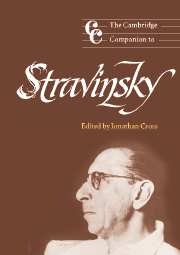Book contents
- Frontmatter
- Part I Origins and contexts
- Part II The works
- Part III Reception
- 9 Stravinsky conducts Stravinsky
- 10 Stravinsky as devil: Adorno's three critiques
- 11 Stravinsky in analysis: the anglophone traditions
- 12 Stravinsky and the critics
- 13 Composing with Stravinsky
- 14 Stravinsky and us
- Chronological list of works
- Notes
- Select bibliography
- Index
12 - Stravinsky and the critics
from Part III - Reception
Published online by Cambridge University Press: 28 September 2011
- Frontmatter
- Part I Origins and contexts
- Part II The works
- Part III Reception
- 9 Stravinsky conducts Stravinsky
- 10 Stravinsky as devil: Adorno's three critiques
- 11 Stravinsky in analysis: the anglophone traditions
- 12 Stravinsky and the critics
- 13 Composing with Stravinsky
- 14 Stravinsky and us
- Chronological list of works
- Notes
- Select bibliography
- Index
Summary
Introduction
R.C.: What do you mean when you say that critics are incompetent?
I.S.: I mean that they are not even equipped to judge one's grammar. They do not see how a musical phrase is constructed, do not know how music is written; they are incompetent in the technique of the contemporary musical language. Critics misinform the public and delay comprehension. Because of critics many valuable things come too late.
In this exchange with Robert Craft, Stravinsky testified to the generic hostility felt by composers toward critics. As we shall see, however, this attitude on the part of this composer concealed a much more complicated relationship with the supposed enemy.
For the purposes of this chapter, ‘critic’ is broadly defined. The tasks of the critic include discriminating between good and bad – with all the intermediate gradations – in composition and performance; discerning continuities and discontinuities between new and older work (again, in both composition and performance), whether of the recent or the more remote past; informing the readership about current issues in the world of the arts. A critic in practice serves as an intermediary between consumer and creator (that is, between listener and composer, or listener and performer), helping both sides by creating an intellectual environment where the former understands better the work of the latter. Critics' activities are informed by the work of historians and analysts, though the character of their output is different. Criticism may take any form from brief newspaper reviews to book-length studies; in some cases humble journalistic endeavour facilitates the development of ideas that later find full expression in amonograph. But both are species of criticism.
- Type
- Chapter
- Information
- The Cambridge Companion to Stravinsky , pp. 230 - 247Publisher: Cambridge University PressPrint publication year: 2003



